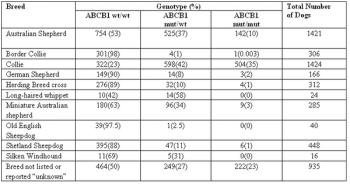Alan Chicoine, DVM, MSc, DACVP
Articles by Alan Chicoine, DVM, MSc, DACVP

Concerns regarding bacterial resistance to antimicrobials are increasing the awareness of rational use in human and veterinary medicine. Successful antimicrobial therapy relies on administering sufficient doses so that pathogens at the site of infection are killed or sufficiently suppressed so that they can be eliminated by the host's immune system.

Inflammation and pain are very common clinical problems in veterinary medicine. Although highly efficacious, use of non-steroidal anti-inflammatory drugs (NSAIDs) is not without risks, especially when used in geriatric or debilitated animals. Practitioners need a basic understanding of the action of these drugs in order to appreciate clinical differences between them.

Pharmacogenomics is an emerging field studying how genetic differences within a population can cause differences in pharmacology. Usually the genetic change will influence the pharmacokinetics of the drug, through altered drug absorption, distribution, metabolism, or excretion.

Information about veterinary drugs, both new and old, is presented to practitioners on a daily basis. This information is vital to educated and rational use of drugs as clinical conditions change and new situations arise. However, like any competitive industry, veterinary pharmaceutical companies need to market their products in a manner that will influence consumers (the veterinarian) to use them.

Drug companies cannot supply labeled drug products to treat every condition in every species, and veterinarians often turn to extra-label drug use (ELDU) to fill these unmet therapeutic needs. A special form of ELDU is compounding medications.

With the increase in concurrent use in small animal patients, drug interactions are becoming more and more likely. Polypharmacy can have a number of unintended side effects.

With the increase in concurrent use in small animal patients, drug interactions are becoming more and more likely.

Glucocorticoids are possibly the most commonly used single drug class in veterinary medicine.

Concerns regarding bacterial resistance to antimicrobials are increasing the awareness of rational use in human and veterinary medicine.

Pharmacogenomics is an emerging field studying how genetic differences within a population can cause differences in pharmacology.

Veterinary clinics are required to treat many different species of animals of vastly different body sizes and physiological needs.

Modern veterinary practice relies on a wide range of pharmaceutical products in order to provide optimum patient care and well-being.

Drug companies cannot supply labeled drug products to treat every condition in every species, and veterinarians often turn to extra-label drug use to fill these unmet therapeutic needs.

Information about veterinary drugs, both new and old, is presented to practitioners on a daily basis. This information is vital to educated and rational use of drugs as clinical conditions change and new situations arise.




